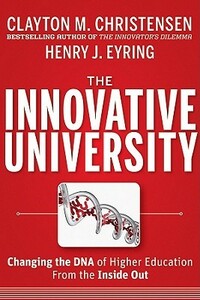Take a photo of a barcode or cover
7 reviews for:
The Innovative University: Changing the DNA of Higher Education from the Inside Out
Clayton M. Christensen, Henry J. Eyring
7 reviews for:
The Innovative University: Changing the DNA of Higher Education from the Inside Out
Clayton M. Christensen, Henry J. Eyring
Essential reading for anyone working in academia and for anyone working in K-12 education with the goal of helping kids climb the mountain to and through college. Also, important reading for any parent who hopes for their children to attend college.
As a professor at a research university, I learned a ton from this book that will help me be a better contributor to great potential higher education holds for society. I come away better grounded in the historical context of higher education and more deeply inspired for the part I might play in its future.
As a professor at a research university, I learned a ton from this book that will help me be a better contributor to great potential higher education holds for society. I come away better grounded in the historical context of higher education and more deeply inspired for the part I might play in its future.
This book was fine.
Published in 2011, Innovative University is one of many many business tomes that should have been (and likely was) an article or paper.
Universities are dinosaurs who are being challenged from the 'low end' of the educational market.
The 'low end' (online primarily) of the market serves customers who are completely ignored by the current university system.
Over time, technology and market acceptance overcomes the incumbents.
Classic Christensen.
And a correct read, imo.
Unless you are in academia, save yourself the time; find the HBR paper that inevitably preceded this competent book.
Published in 2011, Innovative University is one of many many business tomes that should have been (and likely was) an article or paper.
Universities are dinosaurs who are being challenged from the 'low end' of the educational market.
The 'low end' (online primarily) of the market serves customers who are completely ignored by the current university system.
Over time, technology and market acceptance overcomes the incumbents.
Classic Christensen.
And a correct read, imo.
Unless you are in academia, save yourself the time; find the HBR paper that inevitably preceded this competent book.
This book is very long and meticulously researched, and it's actually quite exciting to read. You have to be a higher education nerd to really appreciate it, but I would say that this book is the best of all the books I've read about the future of higher education.
Terrific in-depth look at The Innovators' Dilema and how higher ed needs to evolve. Focus is on the historic development of Harvard and the little-known BYU-Idaho.
Informative, historical, and thought-provoking. Especially for a dad whose first of three just started college. :-)
Informative, historical, and thought-provoking. Especially for a dad whose first of three just started college. :-)
This book is outstanding. If you're in higher ed at all, or if you're interested in the future of higher ed in particular, I cannot recommend this book enough. If you're sending a student to college in the next few decades, I'd recommend it to you, too.
It's really a good read.
This book clearly uses the Innovator's Dilemma as a framework, but also draws on other conceptual models including the competency trap, lean manufacturing, the Pareto principle, and others.
The main takeaways: the most successful institutions (outside the most elite universities) will be those who identify their strengths and emphasize that while reducing non-core services/programs. Specifically, the book advocates a more agile environment, extreme focus on mentoring and student experience, a recognition that not all of our students will be going to graduate school, a reframing of knowledge generation to include things like scholarship of teaching and learning and more application based knowledge creation, and openly sharing the knowledge that is generated by the institution.
Again, if you have any interest in this topic at all: Read This Book!
It's really a good read.
This book clearly uses the Innovator's Dilemma as a framework, but also draws on other conceptual models including the competency trap, lean manufacturing, the Pareto principle, and others.
The main takeaways: the most successful institutions (outside the most elite universities) will be those who identify their strengths and emphasize that while reducing non-core services/programs. Specifically, the book advocates a more agile environment, extreme focus on mentoring and student experience, a recognition that not all of our students will be going to graduate school, a reframing of knowledge generation to include things like scholarship of teaching and learning and more application based knowledge creation, and openly sharing the knowledge that is generated by the institution.
Again, if you have any interest in this topic at all: Read This Book!
Fascinating history of higher education in the United States (focused primarily on Harvard). When they start talking about what's currently happening, it gets alternately scary, intimidating, and hopeful, speaking as someone currently employed in higher education. I liked it. It's not light reading, though.
Loved the history of Harvard and the higher ed system in the US. Wish there were more details on the operations and financial aspects of BYU - Idaho.


